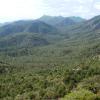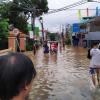Climate & Environment
 At the American Geophysical Union meeting in Chicago through Dec. 16, LASP researchers are presenting the results of recent studies on the massive 2022 Hunga Tonga-Hunga Ha’apai eruption.
At the American Geophysical Union meeting in Chicago through Dec. 16, LASP researchers are presenting the results of recent studies on the massive 2022 Hunga Tonga-Hunga Ha’apai eruption. CIRES co-authored work shows tribal practices blunted wildfires’ impacts in the American Southwest. Bringing “good fire” back to the U.S. and other wildfire-prone areas, as Native Americans once did, could potentially blunt the role of climate in triggering today’s wildfires.
CIRES co-authored work shows tribal practices blunted wildfires’ impacts in the American Southwest. Bringing “good fire” back to the U.S. and other wildfire-prone areas, as Native Americans once did, could potentially blunt the role of climate in triggering today’s wildfires. Of all the troubles in the world, why should single-use shopping bags and straws concern you? Ask Associate Professor Phaedra Pezzullo, who spells out the chilling ramifications of plastic use in her new podcast and book.
Of all the troubles in the world, why should single-use shopping bags and straws concern you? Ask Associate Professor Phaedra Pezzullo, who spells out the chilling ramifications of plastic use in her new podcast and book. The College of Media, Communication and Information received a $25,000 donation from the climate-action organization Mission Zero to further climate-focused work. Faculty and students undertook seven grant projects, tackling climate issues through innovative storytelling.
The College of Media, Communication and Information received a $25,000 donation from the climate-action organization Mission Zero to further climate-focused work. Faculty and students undertook seven grant projects, tackling climate issues through innovative storytelling. Extreme weather and ocean events are on the rise around the world, due largely to human-caused climate change. But to fully understand these changes—and, ideally, to predict when and where they may occur in the future—researchers and policymakers must also take into account naturally occurring climate variability, suggests new research.
Extreme weather and ocean events are on the rise around the world, due largely to human-caused climate change. But to fully understand these changes—and, ideally, to predict when and where they may occur in the future—researchers and policymakers must also take into account naturally occurring climate variability, suggests new research. After three days of dynamic and thought-provoking panels and keynotes at the inaugural Right Here, Right Now Global Climate Summit co-hosted by United Nations Human Rights and CU Boulder, the work now begins on moving the talk about the human rights crisis that climate change is to action.
After three days of dynamic and thought-provoking panels and keynotes at the inaugural Right Here, Right Now Global Climate Summit co-hosted by United Nations Human Rights and CU Boulder, the work now begins on moving the talk about the human rights crisis that climate change is to action. Four panelists at the Right Here, Right Now Global Climate Summit, all young women, expressed the same sentiment: Women and youth are most burdened by climate change, but they are also key to solutions needed now.
Four panelists at the Right Here, Right Now Global Climate Summit, all young women, expressed the same sentiment: Women and youth are most burdened by climate change, but they are also key to solutions needed now. Day three of the Right Here, Right Now Global Climate summit at CU Boulder was filled with discussions of concrete solutions and urgent calls for collective action to reduce the human toll of the climate crisis today and fend off a catastrophic future.
Day three of the Right Here, Right Now Global Climate summit at CU Boulder was filled with discussions of concrete solutions and urgent calls for collective action to reduce the human toll of the climate crisis today and fend off a catastrophic future. During a presentation that conjured reflections from Albert Einstein, Martin Luther King Jr., Matt Damon, Cree elders, and the late South African rapper Riky Rick, Naidoo called for a new kind of collective action to push back on what he calls “climate apartheid”—one that includes more voices, communicates more clearly and even incorporates a little joy.
During a presentation that conjured reflections from Albert Einstein, Martin Luther King Jr., Matt Damon, Cree elders, and the late South African rapper Riky Rick, Naidoo called for a new kind of collective action to push back on what he calls “climate apartheid”—one that includes more voices, communicates more clearly and even incorporates a little joy. After an at-times emotional first day of the summit Friday, in which panelists from around the globe made the undeniable case that climate change is a humanitarian crisis, speakers on Day 2 focused on accountability, called for action and suggested that a human rights framing is precisely what’s needed to spark action.
After an at-times emotional first day of the summit Friday, in which panelists from around the globe made the undeniable case that climate change is a humanitarian crisis, speakers on Day 2 focused on accountability, called for action and suggested that a human rights framing is precisely what’s needed to spark action.


